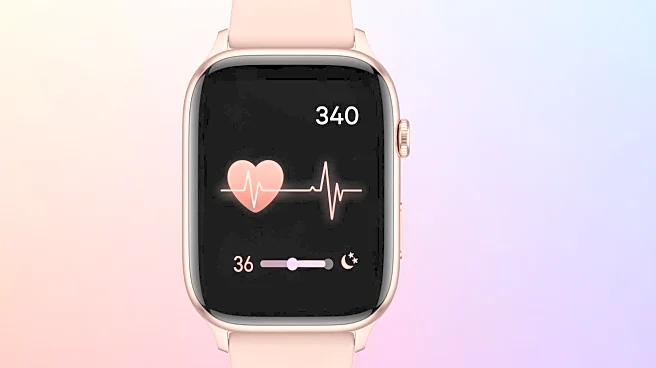What's Happening?
Recent advancements in wearable technology have introduced significant health-focused upgrades, particularly benefiting midlife women. The Apple Watch, Oura Ring, and Samsung Galaxy Watch have all received
updates that enhance their health monitoring capabilities. The Apple Watch now includes features such as hypertension detection and improved workout motivation through its Workout Buddy feature. The Oura Ring has introduced menopause tracking features, while the Samsung Galaxy Watch8 offers antioxidant tracking and vascular load measurement. These upgrades aim to address health concerns prevalent among women experiencing perimenopause and menopause, such as sleep apnea and cardiovascular health issues.
Why It's Important?
The enhancements in wearable technology are crucial as they provide midlife women with tools to better manage their health during a critical phase of life. By offering features that track vital health metrics, these devices empower users to take proactive steps in managing conditions like hypertension and sleep apnea, which are more common during menopause. The ability to monitor and receive alerts about health changes can lead to early intervention and improved health outcomes. Additionally, the motivational features in these wearables can encourage physical activity, which is essential for maintaining overall health and well-being.
What's Next?
As wearable technology continues to evolve, it is likely that more personalized and advanced health monitoring features will be developed. This could include further integration with telehealth services, allowing users to seamlessly connect with healthcare providers for advice and treatment. The ongoing innovation in this sector may also lead to broader adoption of wearables among different demographics, expanding their impact on public health. Manufacturers may focus on enhancing user experience and accuracy of health data, potentially collaborating with medical professionals to ensure the reliability of the information provided.
Beyond the Headlines
The integration of advanced health monitoring features in wearables raises important considerations regarding data privacy and security. As these devices collect sensitive health information, ensuring that this data is protected from unauthorized access is paramount. Additionally, there is a cultural shift towards self-monitoring and personal health management, which could influence how healthcare is approached in the future. The increased reliance on technology for health insights may also prompt discussions about the role of traditional healthcare providers and the potential for technology to complement or even replace certain aspects of medical care.









